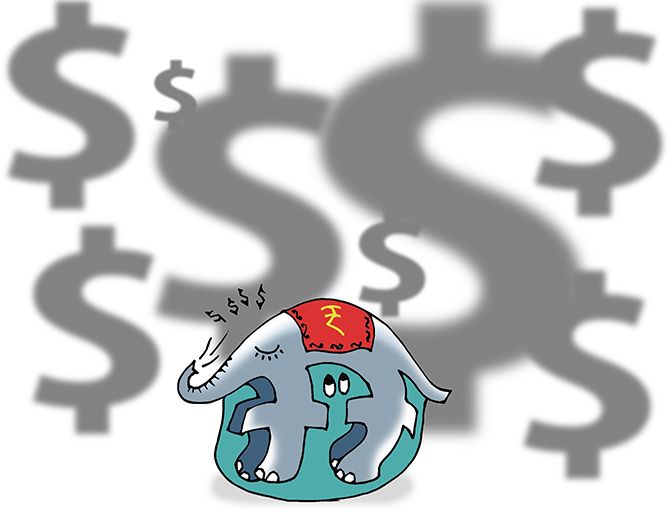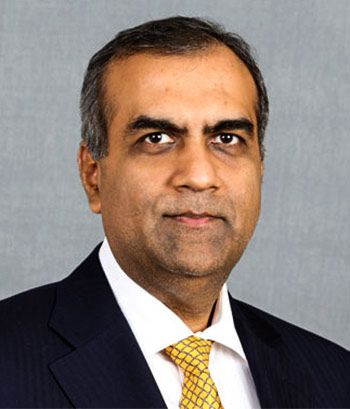'The big elephant in the room is our misguided view about the rupee.'
'India is scared that if our currency appreciates, who will buy from us. But a breakout is inevitable.'

Illustration: Dominic Xavier/Rediff.com
Manish Chokhani, director of investment group Enam Holdings and a long-time observer of Indian equities, in an exclusive chat with Vishal Chhabria and Hamsini Karthik, says investors should brace for volatility, and keep some cash.
While pointing to the current bull run in mid- and small-cap stocks, he advises that only those investors with appetite to absorb shocks participate in this space.
How much leg does the post-budget rally have?
It's a case of liquidity overtaking fundamentals.
This year's Budget was about absence of negatives and the markets are rallying in relief.
This is the normal case in a market cycle when you expect the economy to recover and you don't have on-ground investment proposals from corporates.
So excess liquidity gets into investment assets.
This cycle has been playing out in the last two to three years even as we wait for earnings to come through.
If you juxtapose this with the amount of liquidity sloshing around the world, then the liquidity starts finding reasons to feel positive.
Recently, the liquidity is only domestic inflow driven.
How long will this liquidity stay?
SIPs seem to be the primary drivers of the market at present.
Domestic funds have an average flow of Rs 10,000 crore a month, which is serious money.
Even though FII flows haven't been that much in the last two years -- the fact remains that with endless QE in the developed world, there is surplus liquidity.
This year, for the first time, domestic flows will be more than FIIs.
During this rally, do you get a sense that the market is overheated?
Valuations are not cheap. You will find people are bullish, but hard pressed to give five great stock recommendations.
Earlier there was not this kind of liquidity looking for an outlet, therefore valuation paradigms and return expectations seem to have changed.
In the absence of alternative investment options, equities are moving up.
The sad reality is that the market is too small and shallow.
So the small amounts of money give rise to these rallies.
What is the real issue in your view which is holding back earnings growth?
Most of our problems are largely to do with the loss of purchasing power and plateauing of per capita income in India.
I've been crying about the decline in the rupee.
Our concepts of REER (real effective exchange rate) are outdated.
No one measures us against the Chinese yuan, our only real competitor!
We used to be four-to-one versus the yuan a few years back. We are now ten-to-one versus the yuan.
Yet in the last five years, export growth has been flat including service exports.
It implies that even if you keep depreciating the INR to 200 levels, you still won't get the expected outcome!
Meanwhile you collapse the domestic market by importing inflation and destroying purchasing power and the investment climate.
The West has blown up their economies with too much debt and they are going to be in deflation.
Old economic school is going to say that you (the rupee) must depreciate because your inflation is larger than theirs.
But when the West is printing 2 to 3 trillion dollars every year, having $360 billion of 'reserves' is a misnomer.
The big elephant in the room is our misguided view about the rupee.
If you were earning Rs 10 lakhs in 2007, it was $25,000. Today the same earnings is only $15,000.
How would you consume with declining real income?
How would you place your bets in equities?
Brace for volatility, keep cash and play sector/stock rotation.
The stock market is game of buying the odds.
For example, you can see mispriced bets across hated sectors.
Stocks like SBI and the Bank of Baroda may not be bad in the PSU banks basket. These are too big to fail.
Since they are not priced right, there is money to be made here.
Same for neglected IT and pharma stocks.
My portfolio is full of consumer discretionary, private banks and NBFCs. But we need to be very stock specific.
Unless you have a glorious bull market you can't take a sectoral call.
The only caution is that in such a volatile world there will be a break out at some point. At that time liquidity will have a premium.
The current bull market is in small- and mid-caps.
So unless you are very sure that you won't be scared of holding the stock in a crisis, you shouldn't hold the stock.
Always keep cash for opportunities -- markets sell off twice a year since last five years!
Stay alert and prepared!
Lot of government action is now going towards the bottom of pyramid segment...
I am an optimist at heart and I want a bull run more than you do.
However, we must learn from the example of China.
When China was growing at 8 to 10 per cent a year, it pegged its currency to the USD that was their main 'competitor.'
It also focused on creation of jobs and growth in real per capita income.
That kind of job creation is not happening in India and hence demand creation is also not happening.
China took the right steps on two things -- they pegged their currency to the USD so they didn't get poorer and poorer.
And two: They created the capacity to export to the world with the infrastructure to support it.
But we seem to think that we can abdicate responsibility for infrastructure to the private sector and bypass job creation and manufacturing growth and instead focus on services.
IT service exports are less than the amount of money we receive through remittances by Indians working abroad!
So after all these years of hype, IT exports contribute to 4 per cent percent of our GDP and are now at risk.
A larger bull market implies a boom for everybody.
But the construct right now is that only few will become rich.
If the government had the guts to demonetise, what's holding them back from privatising old assets to build new capacities in infrastructure?

If the BJP loses in any of the states, is it a vote against demonetisation?
I think that is an overstretched argument. Elections are never fought on a single issue.
In Punjab it will be a vote against drugs and for job creation.
In Uttar Pradesh it's usually about caste and religion, but development will be key.
In fact, at the mass level, the way people cooperated on demonetisation is unprecedented in the world. They see this as fight against the corrupt and the rich, and so even if it caused them inconvenience they were okay with it.
Trump is implementing his election promises...
The world is clearly de-globalising.
All the Western economies are ex-growth and at this time they will tend to be increasingly protective.
Businesses will have to be disruptive and innovative at these times.
The tailwind of globalisation we got from 1990 to 2008 is certainly gone.
That is the challenge -- technology, de-globalisation and geopolitics.
China is playing the game very smartly, whether on geopolitical issues or across industries. The markets are currently driven by China.
Nobody would have thought that the best performing stocks of 2016 will be metal stocks.
Right now we are used to looking at the US Fed for cues, but actual impulses are coming from China.
What are the headwinds the market is not factoring now?
Geopolitical risks and a regime change in the world order.
It's a holding pattern since 2008; a game of ring a ring o' roses, either across markets or asset classes.
Gold is out of flavour today, six months later it will once again become attractive.
In technical parlance you are looking for break out, but nobody is breaking out.
Everyone is trying to maintain the status quo.
The West should see currency depreciation and get a lot poorer.
India is scared that if our currency appreciates, who will buy from us. But a breakout is inevitable.
We think their governments will come to the rescue again, but they have fired all the brahmasthras and there's very little to fire.
A very famous investor has said Japan is a bug in search of a windshield. It has to blow at some point.
The government debt to GDP is 350 per cent. The demographics have gone wrong and the same applies to Europe.
This is why the US dollar is strengthening.
But if dollar appreciates or interest rates rise, the US will also be in a big mess.
So the ultimate game will be solved through major currency realignments.











